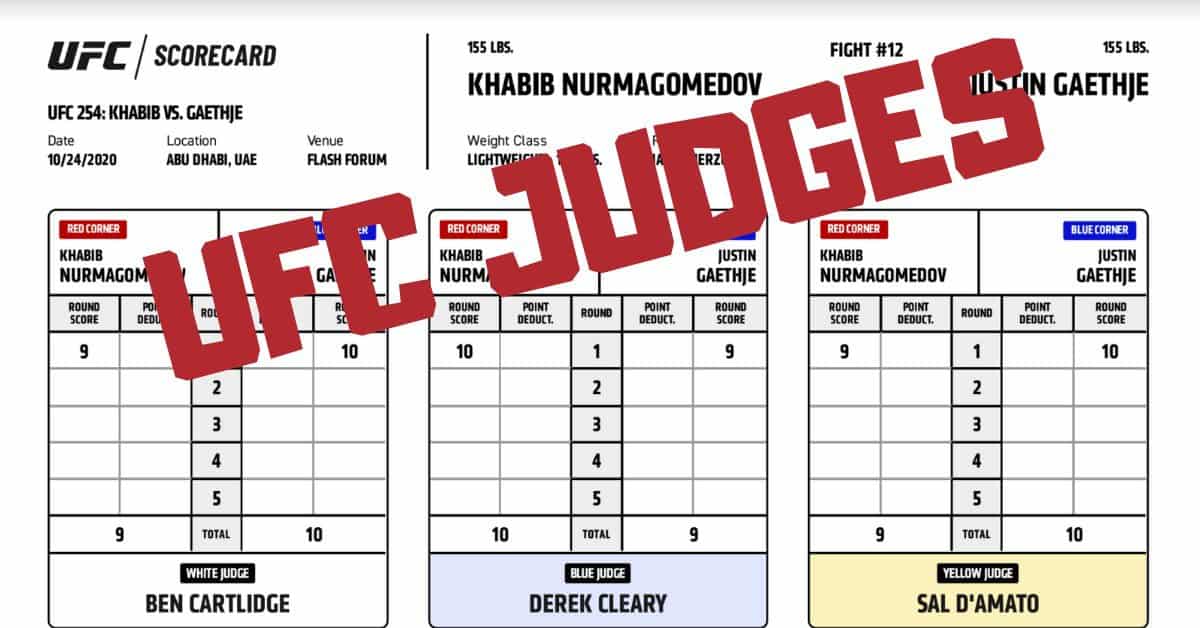It’s not rare to see UFC fights going the distance, leaving the judges to decide who is the winner. Sometimes, it’s an easy task when it’s clear which fighter dominated the fight. On the other hand, it’s not that simple, leaving everything to the judge’s interpretation.
It’s hard to regulate MMA judging. Some judges value striking more, while others lean more towards grappling, takedowns, etc. That leads to numerous controversial decisions, leaving fans to question – who are the UFC judges? Who sanctions them? How much are they paid to judge UFC fights?
Let’s dive deep into the job of UFC judges, how they get selected to judge a UFC event, and ultimately, why fans are so often dissatisfied with UFC and MMA judging.
How Many UFC Judges Are There?
Before we get into the specifics, it’s important to note a distinct difference between a UFC/MMA judge and a referee.
The referee is the guy you see inside the octagon with the fighters, getting them up on their feet, warning them about restrictions, and stopping the fight if necessary.
The judges sit outside the cage, evaluating the fight per round, giving points, and ultimately deciding who the winner is if none of the fighters finishes their opponent.
Three judges are evaluating every fight. They all have individual scorecards, and every round gets evaluated separately. The fighter that has more points after all the round scores are added up is the winner.
Generally, the UFC has no judges on its staff roster. Athletic Commissions delegate the judges, and they get paid for each event separately.
Some fans see that as the problem, as the UFC has no control over how the fights are scored. Others see it as a great thing because if the judges aren’t on the UFC’s regular roster, they won’t judge according to the promotion’s interests (for instance, giving the win to the more popular fighter, etc.).
How Do UFC Judges Score Fights?
The fighter that the judge considers to be the winner of the round gets ten points. The fighter that lost the round would get nine points if the round weren’t completely one-sided. If they lose significantly (for instance, getting knocked down a few times, barely surviving before the bell), they get eight points.
That means every round can be evaluated 10-9 or 10-8, depending on how dominant the round winner was. If a fighter gets a one-point deduction from the referee, the round’s score can be different (10-7, 9-9, or 9-8).
All three judges score the rounds separately, and then they accumulate all the round scores to get the final result. If all three judges came to the same conclusion, it’s called a unanimous decision.
If two judges gave the nod to one fighter while the third judge had his opponent as the winner, it’s called a split decision. There’s also the majority decision, where two judges saw one fighter as the winner, while the third judge scored the fight as a draw. You can also have a majority, unanimous, or split draws, where the fight has no winner.
That’s where the controversy around UFC (and MMA in general) judges stems from. If all judges have the same job and all watch the same fight, how can one judge determine one fighter as the winner while another judge sees his opponent as the winner? The problem is that there’s no unification into how the fights are scored. There is, but it’s all opened to interpretation.
Let’s say Fighter A controls the majority of the round, being in the dominant position, taking the center of the octagon, and applying pressure. However, they do no significant damage. On the other hand, Fighter B works from the back foot and completely dominates the last minute of the round, dealing significant strikes and a lot of damage.
One judge will evaluate the dominant position and control of the cage as more valuable, even though there wasn’t any significant damage dealt, giving Fighter A the round. The other judge will value significant strikes and the damage inflicted more, so in their eyes, Fighter B will be the winner of the round. The question is, who’s in the right here?
Who Are the UFC Judges?
Athletic commissions delegate UFC judges. For example, if the event is held in Los Angeles, CSAC (California State Athletic Commission) delegates the judges. If we’re in Las Vegas, NSAC (Nevada State Athletic Commission) is responsible for the judges.
More often than not, the judges do a good job, scoring the fights appropriately. However, sometimes, there’s such a big discrepancy in the scorecard, you wonder if the judges even watched the same fight (for instance, in a UFC 161 fight between Jake Shields and Tyron Woodley, one judge scored it 30-27 for Woodley, but the other two scored it 29-28 for Shields).
The problem with UFC judges is that most of them were never actually fighters, and they have too much leeway when deciding how to score a fight. So, who are those guys that determine the fate of the fighters – sometimes even their entire careers?
As there are no judges on the roster, I’ll mention some UFC judges that we see the most frequently.
Sal D’Amato
Although Sal D’Amato is one of the judges the UFC uses quite frequently, he’s also one of the judges that seem to be at the center of controversial decisions quite often.
He was the judge for Frankie Edgar vs. BJ Penn 1, which was one of the most controversial decisions of all time. He judged other controversial fights, including Phil Davis vs. Lyoto Machida, Georges St-Pierre vs. Johny Hendricks, etc.
Although we hear controversy about his decisions time and time again, he’s still the judge with the highest number of judged UFC fights (in 2020). [1]
Derek Cleary
If there’s a judge that I’d want to score my fights, it would be Derek Cleary. Every judge gets it wrong sometimes and gets in the center of the controversy, but it seems like Derek Cleary is the guy that has the least of those kinds of fights.
His last semi-questionable decision was giving Joanne Calderwood a 29-28 win over Lauren Murphy at UFC 263. In contrast, the other two judges gave the win to Murphy, but it was a pretty close fight, so you can’t blame him for making that decision.
However, he was blasted by Dana White for giving Jan Blachowicz a 10-8 round over Israel Adesanya. While Blachowicz clearly won the round (and the fight), White argued that a 10-8 round has to be an “a** whooping” and that the judges give out 10-8 scores too easily.
Chris Lee
If there’s a controversial UFC judge around, it has to be Chris Lee. In 2020, Lee was involved in 11 split-decision bouts, and eight out of those eleven times, he was the judge that disagreed with the eventual decision.
Many fighters (like Israel Adesanya) ensure that he doesn’t score their fights because they are almost sure he’ll get it wrong.
His most controversial decision was when he gave a 48-47 win to Paul Felder against Rafael Dos Anjos, while the other two judges gave all five rounds to RDA (50-45). Even Felder criticized Lee for the decision, saying he “clearly lost four rounds,” with the one remaining round being quite close.
After 15 years of judging UFC fights and so many bad decisions, I don’t know how he is still in the game.
Junichiro Kamijo
I’m putting Junichiro Kamijo on the list, not because of his controversial decisions, but showing you just how much judge’s preferences in scoring can play a part in determining the winner.
According to research, Kamijo tends to value grappling a lot more than striking. If you get a tight submission attempt (but fail to finish), an average judge will give you twice the points compared to a regular submission attempt. In Kamijo’s case, he values tight submission attempts not twice but eight times more valuable!
That means effective grappling is way more valuable than effective striking in his eyes. If you locked in a tight submission, but the opponent survived, you’ll likely get the round from him, even if the rest of the round was going in the opponent’s direction.
Other frequent UFC judges: Michael Bell, Eric Colon, Dave Hagen, Ron McCarthy, Clemens Werner, etc.
How Much Do UFC Judges Get Paid?
According to NSAC, MMA judges don’t have a regular salary, but they get compensated after each event they work on. [2]
Their pay depends on how much experience they have, how reliable they are, how difficult the event was (how many close decisions they had to make), and ultimately, how big the event was.
As the judges get paid for every event individually, there isn’t much information on how much they make. Some sources say it’s between $300 and $600 per event outside the UFC, depending on how big the event was.
Talking strictly about UFC, the judges get around $900 for every event. If the event is huge (like UFC 229: Khabib vs. McGregor), salary can increase to several thousand bucks. If you ask me, it’s still a pretty low salary for a company worth over $5 billion.
However, they are entitled to judge any MMA event, not exclusively the UFC. Hence, their annual salary depends on how many events they do. The problem is, there are no guarantees about how many events they’ll get or how much they will be compensated.
Perhaps that’s a part of the reason why UFC officiating is so poor. Those guys have a super hard job and get tons of criticism for it, but in the end, their salary isn’t impressive at all, and it isn’t even guaranteed.

